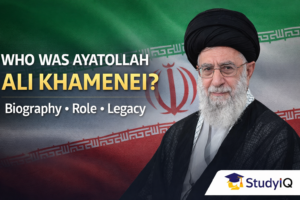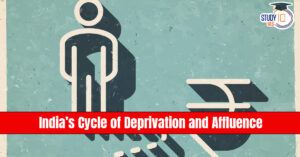Q8. Case Study
In line with the Directive Principles of State Policy enshrined in the Indian Constitution, the government has a constitutional obligation to ensure basic needs – “Roti, Kapda aur Makan (Food, Clothes and Shelter)”- for the under-privileged. Pursuing this mandate, the district administration proposed clearing a portion of forest land to develop housing for the homeless and economically weaker sections of the society.
The proposed land, however, is an ecologically sensitive zone densely populated with age-old trees, medicinal plants and vital biodiversity. Besides, these forests help to regulate miero-climate and rainfalls, provide habitat for wildlife, support soil fertility and prevent land/soil erosion and sustain livelihoods of tribal and nomadic communities.
Inspite of the ecological and social costs, the administration argues in favour of the said proposal by highlighting that this very initiative addresses fundamental human rights as a critical welfare priority. Besides, it fulfils the government’s duty to uplift – and empower the poor through inclusive housing development. Further, these forest areas have become unsafe due to wild-animal threats and recurring human-wild life conflicts. Lastly, clearing forest-zones may help to curb anti-social elements allegedly using these areas as hideouts, thereby enhancing law and order.
(a) Can deforestation be ethically justified in the pursuit of social welfare objectives like, housing for the homeless?
(b) What are the socio-economic, administrative and ethical challenges in balancing environmental conservation with human development?
(c) What substantial alternatives or policy interventions can be proposed to ensure that both environmental integrity and human dignity are protected?
Answer
| Approach: Begin with ethical debate of welfare versus ecology. Examine socio-economic, administrative, and ethical dilemmas in balancing tribal rights, environmental integrity, and housing needs. Suggest sustainable policy alternatives ensuring both human dignity and ecological conservation. Conclude with balanced, inclusive development. |
Forests act as ecological lifelines, ensuring biodiversity, soil fertility, and tribal livelihoods. Yet, providing housing for the homeless is a constitutional mandate under DPSPs (Art. 39, 46, 48A). The challenge lies in balancing social welfare with environmental sustainability.
Stakeholders Involved:
- District Administration
- Homeless and Economically Weaker Sections
- Tribal and Nomadic Communities
- Wildlife and Biodiversity
- Environmental Regulators
- Local Communities
- Anti-Social Elements (alleged)
(a) Can deforestation be ethically justified for social welfare objectives like housing the homeless?
- Yes, conditionally: Housing for the homeless fulfills human dignity (Art. 21) and Directive Principles (Art. 39, 47). It ensures food–shelter–security for marginalized communities.
- No, risks: Forests are ecologically sensitive, support biodiversity, regulate rainfall, and sustain tribal livelihoods. Deforestation harms intergenerational equity (UN Brundtland Report principle).
- Thus, while welfare goals are ethical, deforestation is not the sustainable route; alternatives must be sought.
(b) Socio-economic, administrative, and ethical challenges
- Socio-economic
-
-
- Balancing livelihood of tribals with urban poor’s housing needs.
- Loss of ecosystem services (water regulation, soil fertility).
- Short-term welfare vs long-term ecological costs.
-
- Administrative
-
-
- Pressure to meet welfare schemes vs adhering to Forest Conservation Act, 1980.
- Weak coordination between housing, tribal welfare, and environment ministries.
- Risk of illegal encroachments once clearance is given.
-
- Ethical
-
- Utilitarian dilemma: Greatest good for many vs rights of few (tribals, future generations).
- Justice: Procedural fairness in rehabilitation of tribals.
- Accountability: Duty of administrators to protect natural commons.
(c) Alternatives and policy interventions
- Identify non-forest land
- Housing can be developed on wastelands or degraded land banks, which avoids disturbing ecologically sensitive forests. For example, Madhya Pradesh has used degraded land for rehabilitation projects, balancing ecological safety with human welfare.
- Vertical housing models
- Constructing multi-storey eco-friendly housing in peri-urban areas reduces land pressure while ensuring shelter. Delhi’s DDA flats under in-situ rehabilitation demonstrate how vertical housing accommodates more families with minimum land use.
- Public–Private Partnerships (PPP)
- Green housing through PPP can integrate solar panels, rainwater harvesting, and waste recycling. Andhra Pradesh’s Happy Cities Mission showed how private participation can accelerate affordable yet sustainable housing.
- Tribal empowerment under FRA, 2006
- Gram Sabha consent before any land-use change ensures respect for tribal rights. The Niyamgiri case (2013) in Odisha highlighted how empowering local communities protects both cultural identity and natural resources.
- Compensatory afforestation & biodiversity Parks
- If diversion is unavoidable, CAMPA funds can be used for compensatory afforestation and biodiversity parks. In Chhattisgarh, compensatory plantations have been undertaken alongside industrial land-use expansion.
- Convergence schemes
- Pooling resources from PMAY, Smart Cities, and CAMPA funds ensures efficient housing development without excessive environmental cost. Gujarat’s Rurban Mission integrated housing with employment and infrastructure, offering a holistic model.
Deforestation for housing cannot be a default choice. Ethical governance requires balancing human dignity with environmental integrity. Sustainable housing solutions on alternative lands, combined with ecological safeguards, can achieve inclusive development without sacrificing forests or tribal livelihoods.

 Who Was Ayatollah Ali Khamenei? Biograph...
Who Was Ayatollah Ali Khamenei? Biograph...
 The Cycle of Deprivation and Affluence
The Cycle of Deprivation and Affluence
 NCERT Textbook Controversy and Supreme C...
NCERT Textbook Controversy and Supreme C...




















